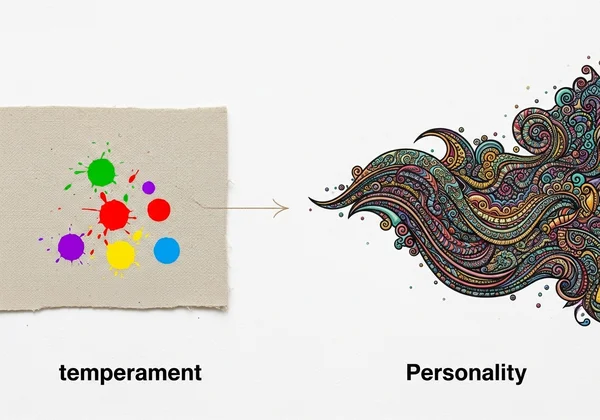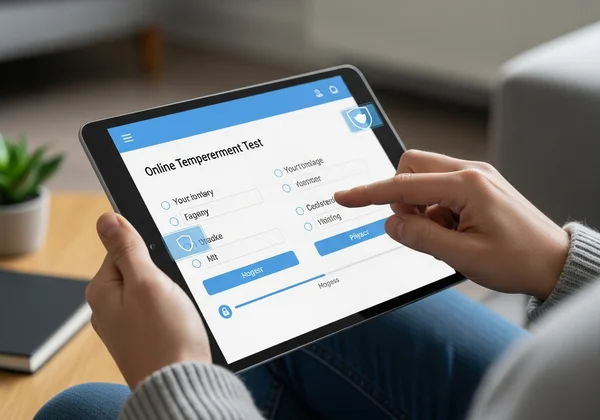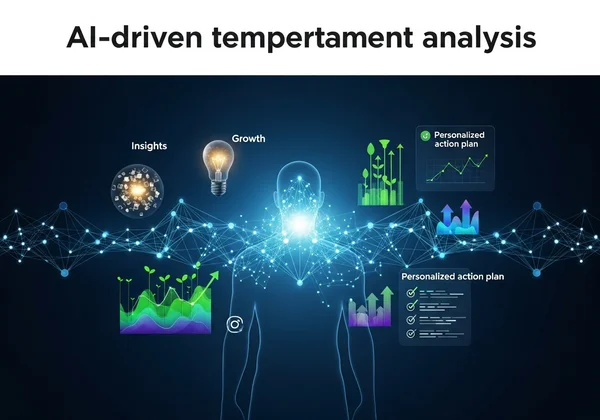Temperament Test Validity: Is It Scientific & Accurate Today?
September 15, 2025 | By Arthur Bowman
In the vast world of online self-discovery tools, it's easy to feel a bit skeptical. We've all clicked on a quiz that promises to reveal our inner spirit animal or which fantasy character we are. But when it comes to understanding our core being, the stakes are higher. So, many wonder: Are online self-assessment tests truly reliable, or are they just for entertainment? If you're seeking genuine self-knowledge, you deserve a tool grounded in real science. This article explores the temperament test validity, diving into its historical roots, modern scientific backing, and what makes a test trustworthy.
The journey to self-understanding begins with confidence in your tools. A legitimate temperament test isn't about fitting you into a rigid box; it's about handing you a key to unlock a deeper awareness of your natural tendencies. It helps you understand why you react, communicate, and lead the way you do. By the end of this guide, you'll see why a scientifically-backed assessment is a powerful first step in your personal growth. Ready to explore a proven framework for self-discovery? You can discover genuine insights on our platform.

Understanding Temperament: Beyond a Simple Personality Test
Before we can assess the validity of a temperament test, it's essential to clarify what we are measuring. The terms "temperament" and "personality" are often used interchangeably, but in psychology, they refer to distinct concepts. Understanding this difference is the first step toward appreciating the depth and accuracy a good test can offer. This isn't just another label; it's a look into the very foundation of your being.
What is the Difference Between Temperament & Personality?
Think of temperament as the raw material of your psychological self. It's the innate, biologically-based set of tendencies you are born with—your natural inclination toward certain emotional responses, activity levels, and sociability. It’s the how of your behavior. Are you naturally energetic or more reserved? Do you react to new situations with excitement or caution? These are reflections of your temperament.
Personality, on the other hand, is the complex structure built upon that foundation. It is shaped over time by your experiences, education, culture, and conscious choices. While your temperament is relatively stable throughout life, your personality evolves. If temperament is the canvas and primary colors you start with, personality is the finished painting—a unique masterpiece created through a lifetime of brushstrokes. A personality temperament test helps distinguish between these layers.

The Enduring Framework of the Four Temperaments
The concept of temperament is not a new-age fad; it is one of the oldest personality theories in history. This enduring framework categorizes temperaments into four primary types: Sanguine, Choleric, Melancholic, and Phlegmatic. Each type represents a distinct cluster of behavioral tendencies and emotional patterns.
This model has persisted for centuries because of its intuitive and practical power. It provides a clear, understandable language to describe fundamental human differences. While modern psychology uses more complex models, the four temperaments remain a valuable and valid starting point for self-exploration. A 4 temperaments test provides an accessible entry into this timeless system of understanding.
The Scientific Basis of Temperament Theory: From Antiquity to Modern Psychology
A common concern among self-improvers and professionals alike is whether a theory rooted in ancient history can hold up to modern scientific scrutiny. Absolutely. The scientific basis of temperament has evolved significantly, transitioning from philosophical observation to empirical research, consistently proving its relevance and utility in understanding human nature.
Ancient Roots: The Origins of Temperament Classification
The theory of the four temperaments dates back to ancient Greece with the physician Hippocrates, who proposed that human behavior was influenced by the balance of four bodily fluids, a concept known as humorism. This early model linked Sanguine (blood) to sociability, Choleric (yellow bile) to ambition, Melancholic (black bile) to introspection, and Phlegmatic (phlegm) to calmness.
While the biological explanation of "humors" has long been debunked, the behavioral observations were remarkably astute. The framework provided one of the first systematic attempts to classify human differences, laying the groundwork for modern personality psychology. Its longevity is a testament to the accuracy of its core insights into our innate behavioral patterns.
Modern Temperament Research: Contemporary Validation & Insights
Modern science has revisited these ancient concepts with sophisticated tools. Contemporary research in genetics, neuroscience, and developmental psychology has identified biological correlates for temperamental traits. For example, researchers have linked differences in neurotransmitter systems (like dopamine and serotonin) to traits like novelty-seeking and harm avoidance, which align closely with the classic temperament types.
Psychologists like Jerome Kagan conducted landmark studies on infant temperament, demonstrating that tendencies like high reactivity (a potential precursor to a Melancholic or Choleric temperament) are observable from birth and remain relatively stable. This modern temperament research validates the core idea that we are born with a predisposition toward certain behaviors. This makes a well-constructed online temperament test a scientifically grounded tool.

Ensuring a Reliable Temperament Test: What to Look For
However, the quality of online tests can vary greatly. To gain meaningful insights, you need to use an assessment that is both reliable and valid. A reliable psychological test consistently produces the same results under the same conditions, while a valid test accurately measures what it claims to measure. So, how can you spot a trustworthy temperament test?
Key Markers of Scientific Validity in Temperament Assessments
When evaluating an online temperament test, look for several key markers of quality and scientific rigor. First, the test should be based on established psychological theory, such as the classic four temperaments framework. The questions should be clear, unambiguous, and designed to assess innate tendencies rather than learned behaviors or current moods.
Furthermore, a valid test provides nuanced results. It should acknowledge that most people are a blend of temperaments and describe your dominant and secondary types, rather than forcing you into a single, restrictive category. Finally, the report should offer constructive insights, framing challenges as opportunities for growth and providing actionable advice. This is the foundation of a truly useful temperaments test.
Addressing Common Concerns About Online Temperament Tests
One major concern is how accurate these tests truly are. How can a simple questionnaire truly capture your complex nature? A well-designed test mitigates this by using carefully crafted questions that prompt you to reflect on your most consistent, long-term patterns of behavior. The key is to answer honestly, based on your natural instincts, not who you think you should be.
Another concern is privacy. When you take our free temperament test, we are committed to confidentiality. Our core testing service is completely free and your data is kept secure. We believe that the journey of self-discovery should be safe and accessible to everyone. You can feel confident when you try our reliable test that your privacy is protected.

Empowering Self-Discovery with Valid Temperament Insights
While knowing your temperament test's scientific validity matters, its true power comes from how you apply that knowledge. A valid temperament profile is not an endpoint; it's a roadmap. It provides a powerful lens through which to view your life, empowering you to make more conscious choices that align with your natural strengths and support your growth areas.
Applying Your Temperament Profile for Personal & Professional Growth
Once you discover your temperament, you can begin to apply that knowledge strategically. In your career, understanding your innate drive can help you find a role that feels energizing rather than draining. A Choleric individual might thrive in leadership, while a Phlegmatic type may excel in roles requiring diplomacy and stability.
In relationships, this insight fosters empathy and improves communication. Knowing your partner is a detail-oriented Melancholic can help you appreciate their need for planning, while understanding a Sanguine friend's love for spontaneity can set realistic expectations. This knowledge transforms potential friction into a deeper understanding and appreciation of differences. You can discover your results and start applying them today.
The Role of AI in Enhancing Accurate Temperament Analysis
To provide an even deeper level of personalization and accuracy, we offer an optional AI-powered report. While our standard test is highly reliable, our AI-driven temperament analysis can synthesize your results with optional background information you provide to deliver highly customized insights.
This advanced analysis goes beyond a standard description of your type. It generates tailored advice on leveraging your strengths, navigating your challenges, and creating a personalized action plan for growth. This technology enhances the accuracy and applicability of your results, making your journey of self-discovery even more powerful. Are you ready to get your AI report?

Trusting Your Journey: Scientific Temperament Tests for Deep Self-Knowledge
To truly understand yourself, you need reliable tools. The theory of the four temperaments, born from ancient wisdom and validated by modern science, offers a reliable and profound framework for understanding your innate self. The validity of a temperament test lies in its connection to this robust psychological tradition and its ability to provide clear, consistent, and actionable insights.
Don't settle for superficial quizzes. Invest your time in a tool designed to offer genuine clarity and empower your personal development. Understanding your temperament is a gift—one that can enhance your career, enrich your relationships, and guide you toward a more authentic life.
Ready to start your journey of discovery? Take the free test today to unlock a deeper understanding of who you truly are.
Frequently Asked Questions About Temperament Test Validity & Application
Are the four temperaments accurate?
Yes, the four temperaments are considered an accurate and useful framework for understanding core behavioral tendencies. While no model can capture 100% of a person's complexity, this system effectively describes fundamental, innate patterns of response. Think of it as a reliable map of your psychological landscape, highlighting the main features of your inner world.
What is the difference between a personality test and a temperament test?
A temperament test focuses on your innate, biologically-based predispositions—the "how" of your behavior that remains stable throughout life. A personality test measures your broader set of characteristics, including beliefs, habits, and traits that are shaped by experience over time. A temperament test uncovers your foundation, while a personality test examines the entire structure built upon it.
How is a temperament test done?
A temperament test is typically done by answering a series of multiple-choice questions. These questions are designed to gauge your natural reactions, preferences, and emotional responses in various situations. For the most accurate results, it's important to answer honestly and reflect on your consistent patterns of behavior rather than your current mood or aspirations.
How do I know my temperament?
The most straightforward and reliable way to know your temperament is by taking a well-constructed assessment. A scientifically-based test will analyze your responses and provide a detailed report identifying your dominant and secondary temperament types, along with insights into your strengths and potential challenges. You can find out now with our free, confidential online test.